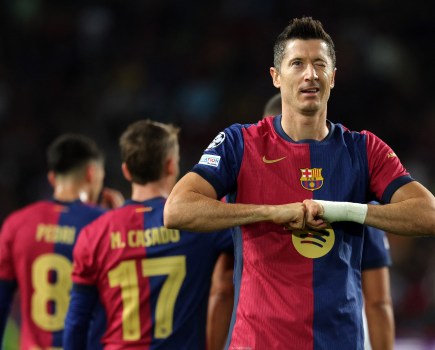Most football fans can recall two German national teams, East and West, participating on the international stage prior to the demolition of the Berlin Wall. But, for a while, a third German national team existed.
In modern Germany, Saarland is a small federal state along the border of France and Luxembourg. In the past, the political identity of this state has been the cause of a tug-of-war between France and Germany.
After World War II, Saarland came under the administration and jurisdiction of France as the Saar Protectorate. Its highly valuable coal industry was one of the reasons why the French government showed great interest in the area. During this period, Saarland had its independent political identity and its own constitution and between 1950 and 1954, it was accredited by FIFA as a separate footballing nation.
Football, of course, wasn’t immune to political reforms. Saarland’s biggest club was 1. FC Saarbrücken, a dominant force in the Gauliga Südwest regional division (one of the sixteen regional divisions in German football during that period). As Saarland was separated from Germany after World War II, Saarbrücken had to sever its ties with German football.
This political change coincided with the advent of the golden period in Saarland’s football. The Saarbrücken team during this era had some great players in their squad. The likes of Herbert Binkert, Herbert Martin and Gerhard Siedl were the stars and alongside Karl Schirra, Sieldl and Binkert formed one of the most deadly striking partnerships in Europe. Too strong to participate in the local leagues of Saarland, the club turned their attention towards France.
Gilbert Grandval, the French high commissioner for the Saar Protectorate, encouraged sporting association between Saarland and France in order to lessen the German influence. Saarbrücken were invited to join the French second division in the 1948-49 season (AS Angoulême was asked to withdraw from the league in order to accommodate them) under the new name of FC Sarrebruck.
As with the regional leagues, the Saarbrücken first eleven was too strong for the French second division teams they faced and they won most of their matches by wide margins (they defeated Rouen 10-1 and Valenciennes 9-0 during the season), winning the French second division comfortably ahead of second placed Bordeaux.
Saarbrücken’s victory meant the French President would have to hand over a trophy and winners medal to a German club and German players, which, at the time, was inconceivable and no trophy was officially awarded.
Jules Rimet, the president of the FFF and FIFA at the time, urged Saarbrücken to join the French Football Federation, but the majority of French clubs voted against this decision in a high profile conference. Rimet resigned from his post of President of the FFF immediately and 1. FC Saarbrücken were left in no man’s land.
Playing against the weak local teams in Saarland to maintain fitness now seemed immaterial, but led to the establishment of the international Saarland Cup in 1949. The Saarland Cup is often considered the predecessor of the present European club competitions. A total of sixteen teams participated in the tournament (including Saarbrücken), fifteen of which were European while Santiago de Chile took the remaining place as a South American entrant. Saarbrücken won the inaugural competition beating Stade Rennais UC in the final and clinching prize money of two million francs Saar (Saarland currency).
The club also arranged a number of friendly matches during this time and the team defeated a number of current big names during the period. Liverpool were beaten away from home, a strong Catalonian side (made up of Barcelona and Espanyol players) were also despatched, and a 4-0 thrashing of Real Madrid at the Santiago Bernabeu were all fine results.
At international level, Saarland joined FIFA in 1950, and in 1952, Helmut Schön, the legendary coach who would later lead West Germany to World Cup glory, left his role at SV Wiesbaden to take over the managerial role of the Saarland national team.
Schön’s first challenge was qualification for the 1954 World Cup. West Germany and Saarland fell in the same qualification group along with Norway. Despite being new to the international arena, ten of the eleven players fielded were from Saarbrücken and Saarland showed their quality in their first match against Norway. The Norwegians raced to a 2-0 lead within the first 15 minutes of the match but Saarland turned it around and won 3-2 with goals from Binkert, Otto and Siedl.
West Germany and Saar faced each other for the first time in the second game of qualification, with the match taking place in Stuttgart in front of a packed house. The atmosphere in the stadium was nothing less than what one experiences during a derby match, but West Germany were too strong for Saar and won 3-0. Saar drew at home against Norway in their next match, which left them in second position in the group. They were just one point behind West Germany now and the next match between these two nations would prove to be decisive. Once again, West Germany demonstrated their class and defeated Saar. The 3-1 scoreline meant West Germany qualified while Saar finished in second spot, ahead of Norway. Schön’s side had failed to qualify, but they did leave their mark on the big stage.
For Saarland’s players there were mixed emotions after the defeat. While some were disappointed, most were happy to see West Germany qualify for the World Cup, a team they had dreamed of representing on the international stage. Kurt Clemens, Saarland’s wing-half summed up the collective emotion; “I still remember today that I wasn’t really unhappy after both defeats. I felt that I was German and didn’t want to prevent the team that I’d always wanted to play for as a boy from getting to Switzerland. We wouldn’t have had a chance at the World Cup anyway.”
Later, in 1954, France and West Germany decided to liberate Saarland of their protectorate status and establish an independent nation. But in a Plebiscite, 67% of Saar’s population voted against the formation of an independent nation. The majority wanted Saarland to join the Federal Republic of Germany (West Germany).
Saarbrucken were meanwhile chosen to represent Saar in the inaugural European Cup in 1955. They were drawn against a strong AC Milan side in the opening round and even the most optimistic supporter wouldn’t have given his team any chance of progression. But they stunned everyone with a fantastic display in Italy, winning the first leg of the tie 4-3 (after being 3-1 down). This provided the platform for a big upset, but Milan defeated their opponents 4-1 in the return leg to win the tie.
In 1957, Saarland was reunited with West Germany and this motion dissolved their status as a separate footballing nation in FIFA. Saarbrücken joined the German league once again and won back the Oberliga title. But despite the victory, and despite the fact that they retained most their key players, a decline was imminent.
Saarbrücken were one of sixteen clubs selected to the play in the first ever Bundesliga in 1963, but the team was no longer the same and a string of poor performances saw them finish at the bottom of the table in the inaugural season. By 1981, they had slipped down to the third tier of German football and they have remained a yo-yo club ever since.
Saarbrücken’s last promotion to the Bundesliga came in 1993, but they were relegated after one season. The club also suffered financial problems and their licence to play was put on hold in 1995 before demotion to the Regionalliga West/Südwest. This was the same club which had once sent shivers through whole of France with their performances in their domestic league; a club which defeated the likes of Liverpool, Barcelona and Real Madrid away from home; a club which formed almost the full national side which took on a strong West German team.
Politically, merging with Germany was the right move, but it battered the footballing identity of the region. Despite hardships, Saarbrücken have shown signs of recovery but they are unlikely to ever reach the dizzy heights of their past.
1. FC Saarbrücken are currently plying their trade in the third division of German football. They lie in 12th spot in the league and 25 points behind league leaders and promotion favourites Osnabrück. But, perhaps most importantly, this is their third consecutive season in this tier for a club that has rarely stayed in one division for long. Financial conditions have improved lately, stability has returned and there are plans for a new stadium which will provide a hike in revenue.
While Saarbrücken might yet make it back to the Bundesliga, the Saarland national team is no more, but it will never be forgotten.
By Amlan Majumdar
This article originally appeared in In Bed with Maradona






